Disability in Comics: The Misconstrued Representation
When doing a quick search on “disabled superheroes” through Google, you are greeted with an obscure list of heroes; either not well-known or mainstream one shots with the disabilities never being treated as something permanent. It is only when digging deeper that results begin to pop up, showcasing well-known names such as Oracle and Daredevil. There are also instances and situations in which heroes have potentially been disabled at times (such as when Thor was cursed into the form of Dr. Blake and sent to earth by his father in various comics staring from Journey into Mystery from 1962). However, these hindrances do not exactly showcase what living with a disability is truly like. When searching “superheroes with mental disorders” a quick list does not even appear and when looking into lists, the results are rather narrow. Heroes and anti-heroes are, much like with those who are physically disabled, either not well-known, have poor or incorrect representation of mental disorders, or suffer a “mental disorder” by being nothing more than psychotic.
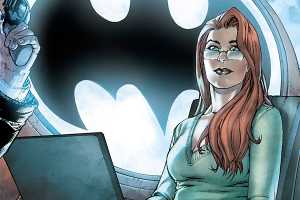 Many people suffer from various disabilities, both mental and physical, and struggle to live with them on a day-to-day basis. Heroes are also meant to represent society, its values, and its peoples. Heroes are held on a pillar of hope; fighting those who thrive on the disruption of peace and destroy tranquil social order. They are protectors, who come in different forms, shapes, and sizes just as people do. In terms of diverse representation, comics have been slowly increasing the diversity of their hero characterization from race, to gender, and sexuality to help reflect where modern day attitudes sit and where societies standards have shifted. However, disabilities are often left behind; treated as a type of paradox when it comes to “super” humans.
Many people suffer from various disabilities, both mental and physical, and struggle to live with them on a day-to-day basis. Heroes are also meant to represent society, its values, and its peoples. Heroes are held on a pillar of hope; fighting those who thrive on the disruption of peace and destroy tranquil social order. They are protectors, who come in different forms, shapes, and sizes just as people do. In terms of diverse representation, comics have been slowly increasing the diversity of their hero characterization from race, to gender, and sexuality to help reflect where modern day attitudes sit and where societies standards have shifted. However, disabilities are often left behind; treated as a type of paradox when it comes to “super” humans.
Portrayal Within Comics
Not all disabled heroes are drowning in obscurity and in fact, most don’t suffer from horrible representation. In particular, within recent years, there has been a huge step of not only understanding mental disability, but also in accepting it. Within comics, the concentration of mental disability has fallen onto post-traumatic stress disorder – or PTSD. Bruce Wayne’s (Batman) trauma over losing his parents often comes to mind when thinking of those who have been prominently plagued by PTSD. Other popular figures that exhibit PTSD symptoms including Steve Rogers (Captain America) and Tony Stark (Iron Man). For Captain America, his PTSD has potentially been triggered by the shock of his unfreezing in the twenty-first century and his memories of World War II. Iron Man, arguably, developed his within events such as the death of his parents and his capture and torture by enemy soldiers (whose origins vary depending on the comic universe). Despite this comic and movie canon, visible symptoms have only begun to show more prominence in recent comic events such as in Age of Ultron.
Unfortunately, comics have yet to showcase and popularize heroes who outright suffer from mental disorders and those who are speculated, such as the schizophrenic Wanda Maximoff (Scarlett Witch), are left unofficially diagnosed nor popularly acknowledged. Nonetheless, there is a lack of heroes with mental disorders such as: obsessive compulsive disorder, depression, bipolar personality disorder, eating disorders and body dysphoria. Those who are more recognized with prominent mental disorders are villains.
Surprisingly, on the physical side, heroes such as Clint Barton (Hawkeye), or Natasha Romanov, (Black Widow) are showcased with disabilities as regular comic canon that has been forgotten by the Marvel movie franchise. Black Widow fights crime with a prosthetic leg, while Hawkeye is 80% deaf and uses a hearing aid. These physical disabilities play active roles in their comic canon lives and do not hinder their abilities what so ever.
Parameters for Powers

All heroes have parameters for their powers, however, for those with disabilities there will always have to be another blockade for what they can and cannot do. For heroes possessing physical disabilities, comics have generally done a fantastic job at portraying what the mental or physical hindrance is, how they are formed and behave alongside their personas and powers, and how they learn to overcome these impediments. A fantastic example of a hero that has grown and learned to overcome their short comings is Barbara Gordon – the former Batgirl turned Oracle. During Alan Moore’s famous graphic novel The Killing Joke, Barbara was shot in the spine by the Joker and as a result was permanently paralyzed. Unable to continue being Batgirl, Barbara did not let her new disability slow her down. With her incredible knowledge of technology, she decided to take upon the new persona of Oracle – an information broker and hacker providing intelligence to not only Batman, but to other superheroes as well.
Another, and truly remarkable character, is Marvel’s mutant genius: Professor Charles Xavier. Suffering from both multiple personality disorder and is paraplegic, Professor X has rarely suffered problems due to his wheelchair confinement and from his extremely powerful, telepathic abilities. In fact, his phenomenal control and knowledge make him a guiding and fatherly figure among other mutants. However, his personalities have taken hold of him before. Suffering from a mental breakdown during the 1996 X-men comics, he became the villainous Onslaught. Overall however, perhaps the greatest parameter for Professor X is how mentally exhausting his powers are. The occurrence in itself is rare and usually only happens when battling other strong telepaths such as Magneto.
Some other heroes include the earlier mentioned Hawkeye, who has absolutely no problem using a hearing aid in the field, as well as the villain, Deathstroke, who is blinded in his right eye. He treats the visual impairment with absolute confidence, going as far as to wear a mask that completely covers the right side of his face to prove that the impeded site does not hinder his abilities as an assassin. Someone who truly does not suffer from their lack of vision is Matt Murdock (Daredevil). After saving a man from an oncoming truck, the radioactive cargo spilled onto him that although enhanced his senses, rendered him totally blind. Nonetheless, with his other senses enhanced, Daredevil is barely slowed down by his blindness.
Influence on Disabled Individuals
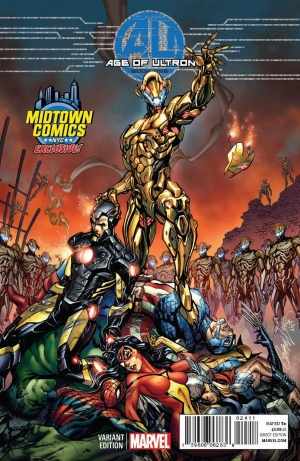
Characters will always influence readers and characters will always reflect something within their readers. For those who suffer from mental and physical disabilities, they will look for characteristics that are reflected within themselves. Physically speaking, there is some positive representation within comic books, such as the earlier mentioned Batgirl turned Oracle. Her character exhibits true strength as she passes through the stages of shock, trauma over the injury, growth, healing, and recovery as she grows past her disability and continues to help in any way she can. Her character evokes a kind of hope that those who also have an existing physical disability. Whether formed through traumatic experiences or have been with them since birth, they can also be great and become larger than their disabilities.
Unfortunately, as mentioned earlier, mental disability is poorly mentioned among heroes and tends to thrive within disastrous situations and villains. The massively popular Joker who is a dominating presence within comics, films, and even video games is riddled with mental illness. However, his cold-blooded, psychopathic killing does nothing more than antagonize those who do suffer from mental illness and is a horrendous representation of extreme actions taken by those who possess mental disability and instability. More so, this destructive behaviour is mirrored through heroes. The PTSD riddled Tony Stark seemed to make a breakthrough within the events of Iron Man 3 after he had come to a realization of how debilitating his extreme anxiety and panic was and aimed to properly heal himself. However, within the next movie and comic installment Age of Ultron, his character reversed back into a state of severe paranoia. In his anxiety induced panic to save those whom he is close too, he created the robot Ultron – who paved his way in blood and death that obliterated the small country of Sokovia. This antagonistic display of mental disability is nothing short of degrading for those who do suffer in day-to-day life just as the disregard of a physical disability is virtually irrelevant because these heroes are “super”. The lack of positive reinforcement within the superhero genre is something that can, and should, be changed.
In Popular Media and the Future
Ultimately, the line is drawn down the middle. Mental and physical disabilities have some good, great, and disappointing or poor representation across the board. Overall representation is often left ignored and even with a few amazing examples, the general portrayal is left flat. Although graphic novels are superior with showing the diversity of those with mental and physical disability, movies are now the dominate media for the superhero genre — where representation is often unrealistic.
Those who suffer do nothing but horrible things or thrive on un-relatable levels. PTSD’s destructiveness that thrive in the modern Tony Stark or Bruce Wayne come to mind, as well as the lack of any popular, physically disabled characters. It wasn’t until the recent Daredevil TV series that a character who is not only physically disabled, but also canonically disabled finally fell into spotlight. Matt Murdock flies solo in this regard, other than characters such as Bucky Barnes (the Winter Soldier) or the recently paraplegic Colonel James Rhodes (War Machine). However, the physical disability is practically none existent, as Bucky Barnes’ metal prosthetic arm is so technologically advanced that it behaves much like a regular arm – something that the average person in today’s society has no chance of experiencing. How Colonel Rhodes’, leg paralysis will be treated in the future Marvel Cinematic Universe is yet to be seen.
Superheroes, regardless of their race, disabilities, background, and story are still fundamentally “idealized humans” and there will always be a level of disbelief in the “superiority” of their abilities. The lack of positive reinforcement within the superhero genre is an old style of writing featuring an archaic form of characterization within comics. Originally, physical deformity was a symbolic demonstration of moral devolution and therefore, was often reserved for villains. Many of them had often become physically challenged, such Heath Ledger’s Joker, or the Spiderman antihero, Chameleon while heroes were left pure, unblemished, and true shining examples of supreme beings. Despite this “perfection” the genre has been moving away from the black and white idealism of “super heroes” to a modern audience’s more preferred “flawed hero”; a “human hero” and someone who can be related to on basic levels. Characters are not perfect, however, their differences and unique traits should not be treated indifferently or as villainous due to their “super powers”. In the future, as we open the gates of diversity, hopefully mental and physical disabilities will be included in the invitation to grow. There is huge potential in creating larger parameters for characters who do suffer, and even simply increasing how these characters or portrayed by making canonically comic disabled characters (such as Hawkeye) also disabled within the larger movie universes. Characters who are both mentally and physically disabled are not invalids and are not villains. They can be great and do “good” with these hindrances, just as ordinary people do in everyday society.
What do you think? Leave a comment.
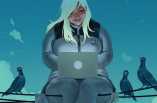
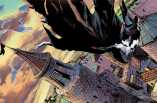
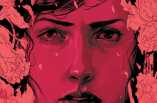
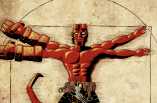
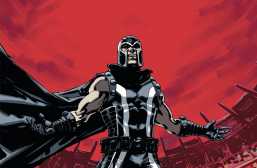
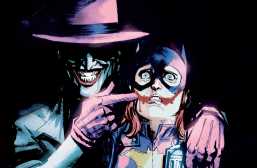
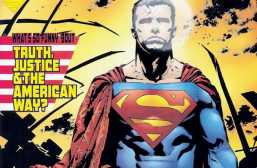
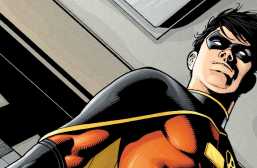
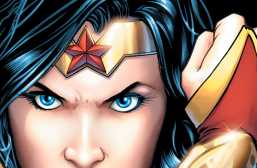
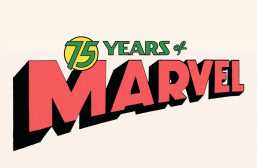
I highly recommend “The Ables” by Jeremy Scott. It is a book about disabled kids in a superhero high school. A good read and an excellent example of how their limitations do not limit what they can accomplish.
Comic book.
Excellent article! I loved your phrase “the gates of diversity.”. Great topic and great analysis with a persuasive tone to advocate for a more complex superhero. I hope that we see more superheroes that have mental and physical challenges as I am a sucker for the underdog and triumph of the human spirit stories.
I’ll have to give it a read! Thanks for the rec!
Sorry, I meant to reply to Tarben’s recommendation of “The Ables”. However, I agree. With the cinematic universe of both Marvel and DC unraveling in popularity I really do hope they choose to represent both mentally and physically disabled characters more often.
I’m glad that you talked about mental disability as well. The fact that it’s present primarily in villains probably only perpetuates the stigma around mental illness. I would love to see a prominent hero with depression or bipolar disorder.
I agree. I think it would be amazing to see a hero struggle with and overcome depression. That could be a really powerful story in the right author’s hands.
There really needs to be more books with disabled characters, for both children and adults. Not just superheroes, but also everyday people who live adventurously, love, laugh and happen to have a disability.
A story doesn’t have to revolve around the disability; it should simply be a factor that adds to the description of the character. More messages like this will stop people with disabilities being seen as ‘other’, and allow people to be inspired to live life to the full.
Why can’t the next Harry Potter be in a wheelchair?
Jean Little is an author who has written several books about children dealing with physical challenges such as cerebral palsy.
There has been some great disabled superheroes. The X Men’s Charles Xavier, Daredevil, Echo ( a deaf superheroine) are to name but a few and the X Men’s Wolverine and Rogue have also battled mental health problems.
Good to see more positive representations of disability within the media.
I sometimes see a trend where the disabled are put under pressure to portray their lives as nothing short of perfect. The sad and lonely and broken need not apply.
Yes: I’m reminded of the emphasis on “positive portrayals” in the LGBTQ community in the ’80s. It was a pain when trying to organise film nights for our student society: a good film that ends tragically, like Another Way, wasn’t approved because it wasn’t “a positive image”. It’s very limiting and ends up promoting anodyne whitewashed pap: no villains, no complicated and ambivalent characters, no tragedies, just simplistic ‘feelgood’ stuff.
May I suggest older people would enjoy “The Ship Who Sang” and the other books in that series by Anne McCaffery
Blind – Daredevil
Lame – Thor
Paraplegic – Professor X
Chronic heart disease – Iron Man
Deadman – dead
Black Racer – in a coma (as William Walker)
It’s only the way they are presented to us, or the way we regard them, that is different from how they would be seen in real life.
Because they have always been presented as positive role models, we have never seen their different characteristics and abilities as an impairment.
Most of the ‘disabilities’ featured in comics are simply accentuated abilities, rather than anything that might debilitate a person in any way.
I am really unfamiliar with comics, though I do watch the superhero franchises, I am by no means well versed on these topics. But, from what I’m gathering from your article, it appears the most common mental disorder is PTSD? I find that interesting, and understandable, as many who suffer from this disease tend to find a means of sublimating these unbearable feelings–as a form of a defense mechanism–into an outlet in which the mind and body can aptly process. Interesting.
Yes, the most common mental disorder that the cinematic and superhero franchise chooses to focus on is PTSD. They’ve done a great job so far, with both Iron Man having panic attacks as well as the silent suffering of Steve Rogers adapting to the twenty first century. However, PTSD is often assumed and suggested as well as the only mental disorder that gains attention. I also find it interesting, and although I didn’t mention it in my article, PTSD is a great way to draw attention towards mental illness because of, as you mentioned, how many people suffered and because of how understandable it is for superheroes to develop it. Thank you!
i really don’t care if any one has a disability because i don’t see their problem i see them for who they are, their life shouldn’t be about their problems or the wheelchair it should be just like us but with a little something else just for the sake of it
“us” includes disabled people.
Good to know that stories are and where made around people with disabilities and comic books wouldn’t be the same without them.
In the indie comic world, I’ve been working on a disabled superhero. In a wheelchair for most of his life, my hero becomes involved in a conspiracy that tests his potential and self-confidence.
It’s not about disability but about diversity.
This is absolutely wonderful, creative, and positive.
Marvel heroes including Spider-Man, the X-Men, Iron Man, Thor and the Hulk— all of these, and in some ways all/most Marvel/Superman DC super-heroes have disabilities.
Great article
Might I draw your attention to the work of Al Davison, a recognised professional comic book artist for whom disability is an important thread through his work. I only came across him recently and am impressed by his drawing and profoundly moved by his work.
Brilliant article.
It’s important for the society to understand that disability doesn’t necessarily mean incapability, particularly when it comes to employment, whilst also acknowledging the occasional hardships and difficulties that affect the disabled in terms of regular tasks the able-bodied/minded take for granted.
Fantastic perspective. You’ve got my wheels turning.
There was one series (I forget the name) in which the superpowers were also super-disabilities. One character was invulnerable to physical attack, for instance, but died when a villain put a plastic bag over his head while he slept. He couldn’t feel it happen; invulnerability also meant insensitivity.
i love this, this is a really informal article – and i love talking about the diversity in comics and how we are showing not just that regular superhero character
WRT: Daredevil. It should be pointed out that although Daredevil’s enhanced senses let him ‘pass’ for sighted, his disability can still hinder him quite significantly in today’s technological age. 1) He can’t use computers or screens without adaptive technology. 2) Anything that requires him to detect color presents a major problem. (Okay, to disarm the bomb, first cut the green wire, then the red…). 3) In comics, he’s been shown to be able to read printed text with his fingers, by distinguishing the difference in thickness between the print and the white space. This is not possible with offset printing, which is very common today. And if the page is laminated, he’s got a problem. 4) His radar sense lets him pick up outlines and contours, but without touching it, he may not be able to tell a concrete wall from a window from a paper screen.
Also, it’s been established in canon that he lives with depression. (PTSD can be inferred/implied, but depression has been stated outright).
For more details, Christine Hanefalk has done a great job exploring his abilities, disabilities, history, etc. at her blog: The Other Murdock Papers.
Aren’t all comic-book superheros ‘disabled’, or ‘other-abled’?
Great article! I especially enjoyed reading about some of the lesser known super heroes.
I really liked this. Well done! I forget about Xavier when I think about disabled characters, I’m glad you reminded me of him here.
I think superheroes are meant to be idealised. They’re there to have a trait in which we aspire to have, or respect. They’re meant to be there for us to feel a certain optimism- maybe if we go through that level of PTSD, that level of social disconnect, that level of training and anger and torture… we too could be just like them! Look at our modern superheroes and ask yourself the question of how relatable they are. They’re our modern celebrities- no one is going to be Miranda Kerr, but they’re all over social media with their humanised personas so that we too could feel like they’re our friends, they’re also walking their dog and eat ice cream! How relatable. Oh, spiderman is struggling to fit in at school? That is so me. Superheroes need to be relatable to be successful, and you sure as hell need a proper background story to emotionally connect us to them.
Love this piece. I really, really hate that Hawkeye’s hearing aids were cut from the film, I get why they were, but still.
It’s good to see discussions of represented disabilities include both physical and cognitive ailments. They’re so often polarized and separated in criticism– and don’t get me wrong, they are fundamentally different– but the tropes they fall into are more like a vehn diagram than two separate lists.
I was disappointed with DC when they retconned Barbara Gordon out of her wheelchair with their New 52. Whilst I understand where a lot of the anger from fans came from in regards to the violence she suffered in Moore’s Killing Joke, I felt that her disability made her not just unique, but showed an immense strength in her character. When I started reading Batman in the 90’s, Barbara Gordon was well established as Oracle and was always portrayed as using a wheelchair. She always seemed the smartest in the Bat family, sometimes even being the mastermind in certain storylines. I feel that reading those stories as a child certainly nurtured my respect towards people with disabilities.
Apologies for posting again on this, I did not notice that I replied to my own article instead of replying to you directly.
Thank you for your comment! You are correct, using bound is not the correct use of the term, and changing it to something along the lines of “Disability in Comics” or “The Misconstrued Representation of Disability in Comics” is far more appropriate and less ableist. It was a mistake that myself and the 6 other reviewers did not notice when this was initially published three years ago. Unfortunately, once articles are published they cannot be revised by the writer. I’ll speak to admin to see if this is possible.
youngmollflanders, I’m not sure what here is the issue. It seems less an issue of grammar and semantics than it is of bad blood between you two. Was “Disability Bound” grammatically correct? Maybe not. Was it intelligible? Certainly. Playing on familiar language and colloquialisms (e.x. Homeward-bound/homeward bound, or housebound) is a perfectly reasonable thing to do in a title. Titles are meant as a hook to catch the audience’s attention. Moving from convention (without sacrificing understandability) is allowed, and honestly encouraged, in this pursuit. Your point, though in my eyes unnecessary, was a valid one to make. Pamela Maria addressed it, and got in touch with the admins to make the change. The change was made because Pamela Maria agreed that it was more appropriate. They also happened to add that it was less ableist with the change. Your most recent reply reads that it is only this reason that the change was made, when Pamela Maria’s initial reply to you shows otherwise. It IS great that the 6 reviewers like their work, as so many others in the comments have shown as well, but Pamela Maria acknowledged that the title could be improved, and has had the change made. It was made in line with your initial recommendation, and happened to work as a way of avoiding ableist language in addition. It has been improved. The fact that you’re giving this consideration to the title after 3 years is admirable, and shows the extent to which you respect writing as an art able to be improved for all of us. Or alternatively, and more in line with the content and tone of your writing, you have some issue with them that shouldn’t be resolved in the comments of a public article. Pamela Maria acknowledged and addressed your concern, and you come back to further make your claim choosing only to focus on half of the reason for it. It’s rude at best, and antagonistic at worst. The Artifice is meant to be a safe space for all of us to write, read, and learn. Please, don’t make it toxic like this.
This article is very well written and I appreciate the nods to the good examples of disability in comics (Barbra Gordan is awesome!) as well as looking for improvement in the industry. If we are looking at comics, in general, I would recommend looking at Avatar the Last Airbender, particularly the character Toph who not only faces the physical challenges associated with blindness but also the social stigma. Yet, she is one of the strongest characters in the series.
I am yet to fully read this piece but I just want to add incase it isnt mentioned that so many mainstream superheroes should be given diagnosis of Autism, ADHD, OCD and many other neurodivergent “conditions” for a lack of a better word.
I should add I am working on writing a Batman script in which he announces his autism and potential OCD which I think would give even more humanity to Bruce Wayne. While also making sure to avoid the clichés of treating autistic people as superheroes with insane unrealistic abilities.